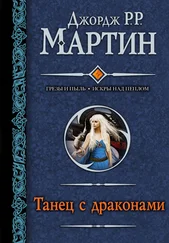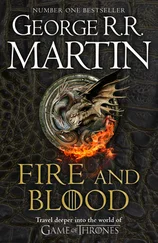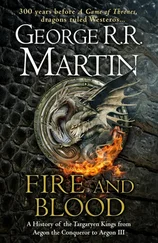Law and tradition were on his side, Grand Maester Munkun admitted when the Hand brought his grievances to the council…but the king and the smallfolk felt otherwise, and it would have been the height of folly to repudiate Lord Alyn’s pact. The other regents concurred. They voted new honors for Oakenfist, confirmed the legitimacy of Prince Viserys’s marriage to Lady Larra, agreed to pay her father the ransom in ten annual payments, and moved a vastly greater sum of gold from Braavos to Lys.
For Lord Unwin Peake, this seemed yet another humiliating rebuke. Coming so close on the heels of the Maiden’s Day Cattle Show and the king’s repudiation of his daughter, Myrielle, in favor of the child Daenaera, it was more than his pride could endure. Mayhaps his lordship thought he could bend his fellow regents to his will by threatening to resign as King’s Hand. Instead the council accepted his resignation with alacrity, and appointed the bluff, honest, and well-regarded Lord Thaddeus Rowan in his place.
Unwin Peake removed himself to his seat at Starpike to brood upon the wrongs he felt he had suffered, though his aunt the Lady Clarice, his uncle Gedmund Peake the Great-Axe, Gareth Long, Victor Risley, Lucas Leygood, George Graceford, Septon Bernard, and his many other appointments did not follow him, but continued to serve in their respective offices, as did his bastard brother Ser Mervyn Flowers and his nephew Ser Amaury Peake, for Sworn Brothers of the Kingsguard serve for life. Lord Unwin even bequeathed Tessario and his Fingers to his successor; the king had his guards, he declared, and so must the Hand.
The Lysene Spring and the End of Regency
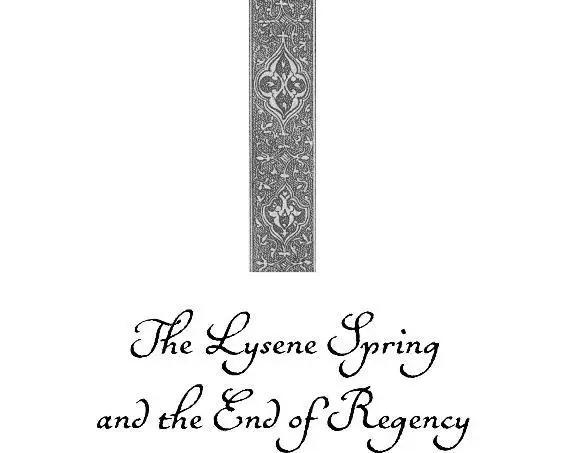
Peace reigned over King’s Landing for the remainder of that year, marred only by the death of Manfryd Mooton, Lord of Maidenpool and the last of King Aegon’s original regents. His lordship had been failing for some time, never truly having regained his strength after the Winter Fever, so his passing excited little comment. To take his place upon the council, Lord Rowan turned to Ser Corwyn Corbray, Lady Rhaena’s husband. Her sister, Lady Baela, meanwhile returned to Driftmark with Lord Alyn and their daughter. Not long after, Prince Viserys thrilled the court by announcing that the Lady Larra was with child. All of King’s Landing rejoiced.
Beyond the city, however, 134 AC would not be a year to remember fondly. North of the Neck, winter still held the land in its icy fist. At Barrowton, Lord Dustin closed his gates as hundreds of starving villagers gathered beneath his walls. White Harbor fared better, for its port allowed food to be brought in from the south, but prices rose so high that good men began to sell themselves into bondage to slave traders from across the sea so their wives and children might eat, whilst worse men sold their wives and children. Even in the winter town, beneath the very walls of Winterfell, the northmen fell to eating dogs and horses. Cold and hunger carried off a third of the Night’s Watch, and when thousands of wildlings walked across the frozen sea east of the Wall, hundreds more of the black brothers perished in battle.
In the Iron Islands, a savage struggle for power followed upon the death of the Red Kraken. His three sisters and the men they had married seized Toron Greyjoy, the boy upon the Seastone Chair, and put his mother to death, whilst his cousins joined with the lords of Harlaw and Blacktyde to raise up Toron’s half-brother Rodrik, and the men of Great Wyk rallied to a pretender called Sam Salt, who claimed to be descended of the black line.
Their bloody three-way fight had been raging for half a year when Ser Leo Costayne descended upon them with his fleet, landing thousands of Lannister swords and spears on Pyke, Great Wyk, and Harlaw. Lord Oakenfist had refused to be a part of House Lannister’s vengeance upon the ironmen, but the old Sea Lion proved more amenable to Lady Johanna’s entreaties…swayed, mayhaps, by her promise to marry him if he delivered the Iron Islands to her son’s rule. That proved beyond Ser Leo’s power to achieve, however. Costayne died amidst the stony hills of Great Wyk, cut down by the hand of Arthur Goodbrother, and three-quarters of his ships were seized or sunk in those cold grey seas.
Though Lady Johanna’s wish to put every ironman to the sword was frustrated, no man could doubt that the Lannisters had paid their debt by the time the fight was done. Hundreds of longships and fishing boats were burned, with as many homes and villages. The wives and children of the ironborn who had wreaked such havoc on the westerlands were put to the sword wherever they were found. Amongst the slain were nine of the Red Kraken’s cousins, two of his three sisters and their husbands, Lord Drumm of Old Wyk and Lord Goodbrother of Great Wyk, as well as the Lords Volmark and Harlaw of Harlaw, Botley of Lordsport, and Stonehouse of Old Wyk. Thousands more would die of starvation before the year was done, for the Lannisters also carried off many tons of stored grain and salt fish, and despoiled that which they could not carry. Though Toron Greyjoy remained upon the Seastone Chair when his defenders beat off the Lannister assault upon the walls of Pyke, his half-brother Rodrik was taken and brought back to Casterly Rock, where Lady Johanna had him gelded and made him her son’s fool.
Across the width of Westeros, another struggle for succession broke out late in the year 134, when Lady Jeyne Arryn, the Maiden of the Vale, died at Gulltown of a cold that had settled in her chest. Forty years of age, she perished in the Motherhouse of Maris on its stony island in the harbor of Gulltown, wrapped in the arms of Jessamyn Redfort, her “dear companion.” On her deathbed, her ladyship dictated a last testament, naming her cousin Ser Joffrey Arryn as her heir. Ser Joffrey had served her loyally for the past ten years as Knight of the Bloody Gate, defending the Vale against the savage wildlings of the hills.
Ser Joffrey was only a fourth cousin by degree, however. Far closer by blood was Lady Jeyne’s first cousin, Ser Arnold Arryn, who had twice attempted to depose her. Imprisoned after his second failed rebellion, Ser Arnold was now quite mad after long years in the Eyrie’s sky cells and the dungeons under the Gates of the Moon…but his son Ser Eldric Arryn was sane, shrewd, and ambitious, and came forward now to press his father’s claim. Many lords of the Vale rallied to his banners, insisting that long-established laws of inheritance could not be put aside by “the whim of a dying woman.”
A third claimant emerged in the person of one Isembard Arryn, patriarch of the Gulltown Arryns, a still more distant branch of that great house. Having split off from their noble kin during the reign of King Jaehaerys, the Gulltown Arryns had gone into trade and grown rich. Men japed that the falcon on Isembard’s arms was made of gold, and he soon became known as the Gilded Falcon. He used that wealth now, bribing lesser lords to support his claim and bringing sellswords across the narrow sea.
Lord Rowan did what he could to alleviate these woes, commanding the Lannisters to withdraw from the Iron Islands, shipping food to the North, and summoning the Arryn claimants to King’s Landing to present their cases to the regents, but his efforts were largely ineffectual. The Lannisters and the Arryns alike ignored his decrees, and far too little food arrived at White Harbor to alleviate the famine. Though well-liked, neither Thaddeus Rowan nor the boy he served were feared. By year’s end, many at court had begun to whisper that it was not the regents who ruled the realm, but rather the moneychangers of Lys.
Читать дальше
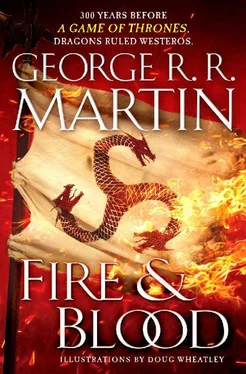


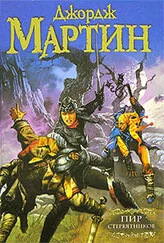

![Джордж Мартин - Сыны Дракона [лп]](/books/33039/dzhordzh-martin-syny-drakona-lp-thumb.webp)
